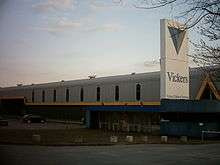Vickers plc
 | |
| Industry | Defence, Engineering, Marine Engineering |
|---|---|
| Fate | Purchased by Rolls-Royce plc and split up |
| Successor |
Alvis Vickers Vinters plc |
| Founded | 1977 |
| Defunct | 1999 |
| Headquarters | United Kingdom |
| Parent | Vickers-Armstrongs |
| Subsidiaries |
Vickers Defence Systems Cosworth |
Vickers plc was the remainder of Vickers-Armstrongs after the nationalisation of three of its four operating groups: aviation (as a 50% share since 1960 of British Aircraft Corporation (BAC) in 1977), shipbuilding (Vickers Limited Shipbuilding Group in 1977) and steel. It was purchased by Rolls-Royce plc in 1999, and the Vickers company name became defunct in 2004.
History
The company was created in 1977 from the rump of Vickers-Armstrongs following the nationalisation of its aviation, shipbuilding and steel businesses. During the 1980s the company acquired businesses in the Automotive Engineering sector (principally Rolls-Royce Motors), the Defence sector (principally Royal Ordnance Factory Leeds) and the Marine Engineering sector (principally Kamewa and Ulstein).[1]
Rolls-Royce plc purchased Vickers plc for £576 million in 1999 for its marine engineering businesses.[2] In 2002, Vickers Defence Systems was purchased by Alvis plc to form the subsidiary Alvis Vickers. In 2003, Rolls-Royce renamed its Vickers subsidiaries Vinters plc.[3] The Vickers name lived on in Alvis Vickers. In 2004, the board of the parent group Alvis approved a £309m takeover bid by the American defence company General Dynamics. Within 3 months BAE Systems, which already had a 29% stake in the company, bid £355m for the company. The action was seen as a defence of the home market from a foreign rival. The bid was accepted by the majority of shareholders. In September 2004, BAE announced the creation of BAE Systems Land Systems, a new company bringing together the BAE subsidiaries, RO Defence and Alvis Vickers. This saw the end of the famous Vickers name after 176 years. In 2005, the acquisition of United Defense led to the creation of BAE Systems Land and Armaments Group.[4]
Businesses
Automotive engineering

In 1980, Vickers plc acquired Rolls-Royce Motors. This was not Vickers' first involvement with Rolls-Royce. In 1966, Rolls-Royce Limited (the original aero-engine and motor car company) acquired Bristol Aeroplane for its Bristol Siddeley engine business, but declared it had no interest in Bristol's 20% shareholding in BAC; Vickers Armstrong and English Electric (EE) each having 40% of BAC's shares. Despite this declaration Rolls-Royce had still not disposed of its BAC stake when the former was declared bankrupt in 1971. The 20% share was eventually acquired from receivership by Vickers and GEC (EE's parent company). In 1990, the Cosworth automotive engineering group was purchased. Vickers divested its automotive interests in 1998, selling Cosworth and Rolls-Royce Motors to Volkswagen Group. The disposal of Rolls-Royce was a complicated affair, involving BMW and legal issues surrounding the use of trademarks which were shared with Rolls-Royce plc.
Defence
In 1986, Royal Ordnance Factory Leeds (ROF Leeds) was purchased and became the core component of Vickers Defence Systems. These interests were primarily centred on land warfare products and brought the Challenger 1 tank into Vickers' portfolio. Vickers would later develop this into the Challenger 2 tank, the current main battle tank of the British Army and Oman. In 1999 Reumech, owner of OMC, the South African defence company was purchased and renamed as Vickers OMC. In 2004, Vickers OMC was sold to BAE Systems.
Marine engineering
Vickers was the parent company of the Brown Brothers group, which produced marine steering gear and stabilisers. In 1986, it purchased Kamewa a Swedish manufacturer of waterjets, followed in 1998 by Ulstein (Norway), a major marine propulsion and engineering company. The companies were formed up as Vickers Ulstein Marine.[5]
References
- ↑ Vickers targets new military sector The Guardian, 3 September 1999
- ↑ "Business: The Company File: Rolls-Royce to buy Vickers". 20 September 1999. Retrieved 5 November 2012.
- ↑ Rolls-Royce plc "Principal subsidiary undertakings" Retrieved 12 June 2006
- ↑ BAE Systems to buy US rival UDI BBC, 7 March 2005
- ↑ Rolls Royce Marine
- Companies House. Retrieved 22 June 2006